 Petzlover
Petzlover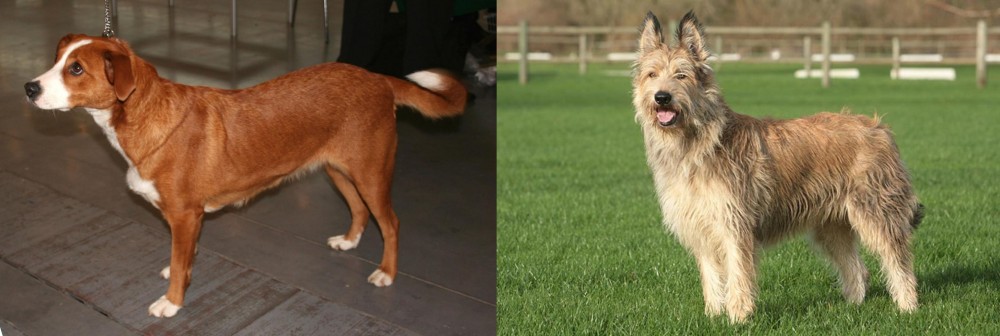 Austrian Pinscher is originated from Austria but Berger Picard is originated from France. Austrian Pinscher may grow 15 cm / 5 inches shorter than Berger Picard. Austrian Pinscher may weigh 14 kg / 30 pounds lesser than Berger Picard. Both Austrian Pinscher and Berger Picard has same life span. Austrian Pinscher may have less litter size than Berger Picard. Austrian Pinscher requires High Maintenance. But Berger Picard requires Low Maintenance
Austrian Pinscher is originated from Austria but Berger Picard is originated from France. Austrian Pinscher may grow 15 cm / 5 inches shorter than Berger Picard. Austrian Pinscher may weigh 14 kg / 30 pounds lesser than Berger Picard. Both Austrian Pinscher and Berger Picard has same life span. Austrian Pinscher may have less litter size than Berger Picard. Austrian Pinscher requires High Maintenance. But Berger Picard requires Low Maintenance
 The Australian pinscher exists from the early nineteenth century in Australia. They were originally breed and raised to be great family pet and the guard of the property. They don’t have the gene for a hunting and that’s why they were kept close to the family. Since they were thought to live in areas where they can roam and run free, they have a high daily need for the activity.
The Australian pinscher exists from the early nineteenth century in Australia. They were originally breed and raised to be great family pet and the guard of the property. They don’t have the gene for a hunting and that’s why they were kept close to the family. Since they were thought to live in areas where they can roam and run free, they have a high daily need for the activity.
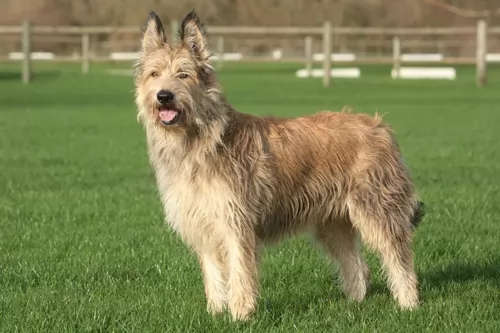 In the Picardie region of northeastern France saw visiting Celts/Franks enter the region along with a shepherd dog. They arrived in the Pas de Calais in 800 AD and might be the oldest shepherd dog of France. Named for Pacardy, the Berger Picard is certainly one of the most ancient of today’s French breeds. Some believe this shepherd comes from the lines of Dutch and Belgian Shepherds, while other insist he is related to the Beauceron and Briard.
In the Picardie region of northeastern France saw visiting Celts/Franks enter the region along with a shepherd dog. They arrived in the Pas de Calais in 800 AD and might be the oldest shepherd dog of France. Named for Pacardy, the Berger Picard is certainly one of the most ancient of today’s French breeds. Some believe this shepherd comes from the lines of Dutch and Belgian Shepherds, while other insist he is related to the Beauceron and Briard.
Never popular as a show dog due to its shaggy appearance, even though it was entered in Frances first dog show in 1863, the breed was almost extinct following the second World War. Currently there are a little under 5000 left in the world with most of them, 3000, in France. The Picard is a good herding dog and loved by the shepherds of the Picardy region. The United Kennel Club recognized the rare breed in 1994, but the AKC did not recognize it until 2016.
The Berger Picard is a loyal, people-oriented dog, good with children and families if socialized as a puppy. In 2006 the Berger Picard Club of America was formed as more and more dogs are being imported from France. There was a genetic study done this year that proposes that 7 breeds of shepherd all descended from a European herding dog that was all over Europe before 1859. This dog was the father of the Berger Picard, the German Shepherd, The Bergamaso Shepherd, the Lupino de Gigante, the Cane Paratore, the Cane da pasore della Lessinia e del Lagorai , and the Pastore d”oropa. After recognition, the Picard was shown for the first time at Krufts in March 2016. They followed that with a best of breed win by Gabby, Guess V.D. Benedicks
 The Australian pinscher, medium sized dog breed, with strong and solid body muscularity, is a happy dog with generally very positive personality. They don’t weight much, and they have usually athletic bodies because they are very active dog kind. Their head is built as a roundish triangle with wrinkled wide forehead and strong cheekbones. They have strong scissor bite and usually darker lips. They have brown or golden brown lively eyes, medium to small ears that fit perfectly to the head size. Their tails are most of the time happy and up in the air, usually fluffy because of the longer hairs on the tails.
The Australian pinscher, medium sized dog breed, with strong and solid body muscularity, is a happy dog with generally very positive personality. They don’t weight much, and they have usually athletic bodies because they are very active dog kind. Their head is built as a roundish triangle with wrinkled wide forehead and strong cheekbones. They have strong scissor bite and usually darker lips. They have brown or golden brown lively eyes, medium to small ears that fit perfectly to the head size. Their tails are most of the time happy and up in the air, usually fluffy because of the longer hairs on the tails.
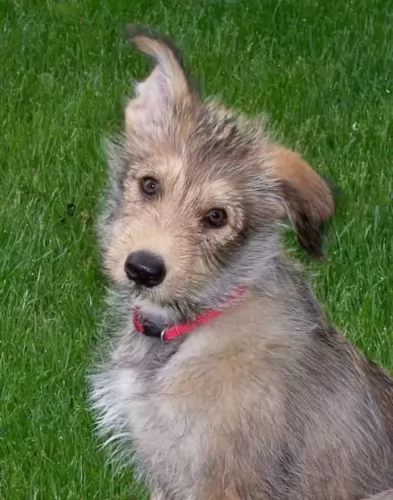 The Berger Picard is a muscular, medium sized, faithful companion. He is especially great with an owner who is athletic and energetic. They have a rugged constitution, slightly longer back, and full tail. The coat is thick, strong and harsh. They are never overweight or bulky. This gives the Berger Picard the look of a mixed breed dog. They have erect ears and thick eyebrows. This lanky looking dog is alert and lively. Movement is efficient, free and tireless. They have strong bones with a sturdy build and a take charge personality.
The Berger Picard is a muscular, medium sized, faithful companion. He is especially great with an owner who is athletic and energetic. They have a rugged constitution, slightly longer back, and full tail. The coat is thick, strong and harsh. They are never overweight or bulky. This gives the Berger Picard the look of a mixed breed dog. They have erect ears and thick eyebrows. This lanky looking dog is alert and lively. Movement is efficient, free and tireless. They have strong bones with a sturdy build and a take charge personality.
They have a strong rectangular head that is not massive. His eyes are oval and medium sized, never round or protruding. Eye color should be dark and never yellow. Cheek muscles are strong, and muzzle is smooth, ending abruptly at the nose. Scissors bite, deep chest and round feet. There should not be any dewclaws on the back legs.
 If you decide to have an Austrian pinscher as a pet in a family with small children, you will make a great choice. Their playful nature and energetic behaviour have been accepted by the children very well. They have an affectionate attitude towards their family, and they will be the great watchdog for your children.
If you decide to have an Austrian pinscher as a pet in a family with small children, you will make a great choice. Their playful nature and energetic behaviour have been accepted by the children very well. They have an affectionate attitude towards their family, and they will be the great watchdog for your children.
Guarding a farm, large yard, animals on the farm or in a yard. Guarding and playing with children, long runs or long bike rides. They will follow you anywhere.
Since they are great with the family and children as well, they can’t be rated with a five-star grade for stranger friendliness and other dog’s friendliness. Sure, they can be trained to be very socialized if you have the time and the patience, but if you don’t you shouldn’t be surprised if they are generally not stranger friendly. It’s their nature. They are devoted only to the family and they usually have a hard time when their family leaves them. This breed is not advisable to be kept indoors or with the seniors that don’t move much.
The Austrian pincher's ability to learn fast and be trained quickly is not super good. They do well – they will listen to their owners always but they are not so great when it comes to learning trick for fun. They will be more than happy to run to catch the ball, but they won’t give it back because they can play alone. They can be learnt to do the basic things, but their lovable and playful nature will overall and they will end up asking for an ear scratch or a belly rub.
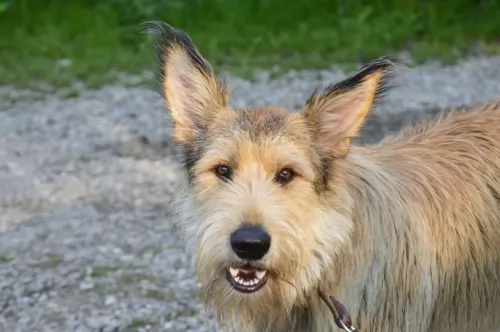 The Berger Picard needs to be a part of a pack with an owner who is clearly the pack leader. This is an intelligent, friendly, and sensitive to harsh voice scolding. They are not easy to train, and you need to be calm and patient when working with him. The Picard has a tendency to be stubborn with an owner who appears to be weak. If raised with or socialized to children and other animals, they will live fine with them. They are best in a rural environment rather than a close neighborhood. They are very quiet dogs, but they need a job and they excel at work.
The Berger Picard needs to be a part of a pack with an owner who is clearly the pack leader. This is an intelligent, friendly, and sensitive to harsh voice scolding. They are not easy to train, and you need to be calm and patient when working with him. The Picard has a tendency to be stubborn with an owner who appears to be weak. If raised with or socialized to children and other animals, they will live fine with them. They are best in a rural environment rather than a close neighborhood. They are very quiet dogs, but they need a job and they excel at work.
 They usually have no health issues like skin irritations, problems with eyes or ears, but they need to be groomed regularly because they shed a lot. They don’t need the regular baths, but when you do bathe them, take a good care of washing and rinsing their thick undercoat. Keep their ears clean and their claws tidy, and you will be happy together. There is a normal percentage of the joint injuries and heart malfunctions due to the increased activity. But, if you take a good care of your Austrian Pinscher, you wouldn’t have to worry about this at all.
They usually have no health issues like skin irritations, problems with eyes or ears, but they need to be groomed regularly because they shed a lot. They don’t need the regular baths, but when you do bathe them, take a good care of washing and rinsing their thick undercoat. Keep their ears clean and their claws tidy, and you will be happy together. There is a normal percentage of the joint injuries and heart malfunctions due to the increased activity. But, if you take a good care of your Austrian Pinscher, you wouldn’t have to worry about this at all.
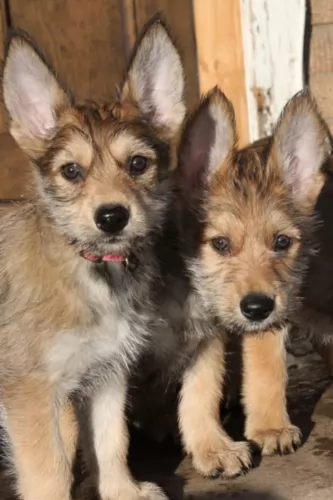 The Berger Picard is not a heavy or extra-large dog, but they still can have hip dysplasia, though it is not nearly as prevalent as it is in larger breeds. Eye infections can present in puppies more than adults and hereditary eye issues such as PRA and RD are all too common. (Progressive Retina Atrophy and Retinal Dysplasia)
The Berger Picard is not a heavy or extra-large dog, but they still can have hip dysplasia, though it is not nearly as prevalent as it is in larger breeds. Eye infections can present in puppies more than adults and hereditary eye issues such as PRA and RD are all too common. (Progressive Retina Atrophy and Retinal Dysplasia)
 Just like any other active dog, the Austrian Pinscher loves to eat. But they usually know their limit and they are almost never obese. While they are pups, it is best for them to have meals in the morning, afternoon and in the evening. Meals should be rich in nutrients and in small portions. When they grow up, they will need two meals during the day. Take a good care while feeding them – read about the portion needed for their weight and don’t give him extra portions or human junk food. They generally don’t like raw meat, but you can chance on of the daily portions with some meat cooked in the water without any spices.
Just like any other active dog, the Austrian Pinscher loves to eat. But they usually know their limit and they are almost never obese. While they are pups, it is best for them to have meals in the morning, afternoon and in the evening. Meals should be rich in nutrients and in small portions. When they grow up, they will need two meals during the day. Take a good care while feeding them – read about the portion needed for their weight and don’t give him extra portions or human junk food. They generally don’t like raw meat, but you can chance on of the daily portions with some meat cooked in the water without any spices.
Organize your day to have an hour or two for this lovely pet. Austrian pinscher likes to be cuddled, petted and being played with. Be affectionate towards this dog breed because they will be happier and more protective towards you. They like to show love but they also have a need to be appreciated and loved. Keep them off the leach as much as possible and don’t leave them alone for a long period.
This lively and energetic dog breed will do well while they have enough place to run. If you have a small yard, take them for a run with you or drive a bike and let them follow. They like to bark, and they will do that if they want your attention.
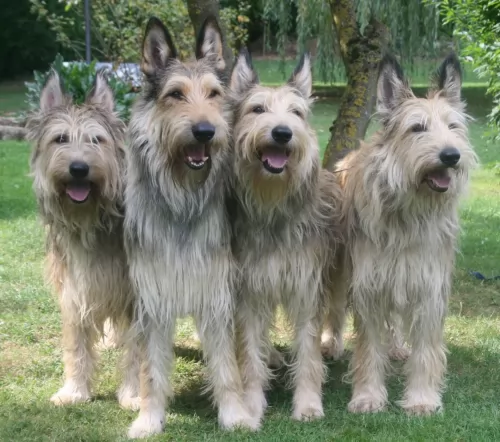 This is an athletic and active breed with a lot of energy. They need a high-quality food that is full of nutrients and not empty calories. Don’t overfeed him as some will have a tendency to become obese. They should be fed twice a day in equal proportions. Treats are good when training but don’t overdo it.
This is an athletic and active breed with a lot of energy. They need a high-quality food that is full of nutrients and not empty calories. Don’t overfeed him as some will have a tendency to become obese. They should be fed twice a day in equal proportions. Treats are good when training but don’t overdo it.
Since the Berger Picard has not been overbred, there are not a lot of genetic disorders in the breed. They do have some
You should have your puppy certified by the Orthopedic Foundation for Animals (OFA) and then the Canine Eye Research Foundation that they do not have these issues and if they do, resolve them. The results of these tests should be published in the OFA registry. This breed is also a participant in the Canine Health Information Center. This means their eyes and hips have been checked and the results published. Their blood is being stored for DNA purposes and one of the following have been evaluated: heart, elbows or thyroid. There is an OFA Berger Picard health survey whose results are available to anyone who asks. This does not track individual dogs but the breed as a whole.
This is a breed that needs a lot of exercise. She likes to swim, take long walks, take runs with you on your bike. They love to jog with you as well. Agility, obedience and any other type of competition will appeal to your Picard. However, don’t expect them to excel at competition because they are not consistent performers. But if they don’t get enough exercise and fun they will become very destructive. Barn hunt and non-competitive herding activities are perfect for the Picard.